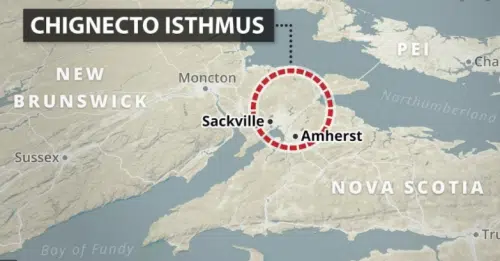A New Brunswick senator’s push to have the Chignecto Isthmus brought under federal control has cleared a big hurdle.
On Tuesday, senators voted 55-10 in favour of a bill declaring the dyke network as being “for the general advantage of Canada.”
That means the bill, which was put forward by Sen. Jim Quinn, will now make its way to the House of Commons for debate.
“I wasn’t sure it would get past that hurdle but at the end of the day it did,” Quinn said in an interview on Wednesday.
The bill comes amid an ongoing dispute between the federal government, New Brunswick, and Nova Scotia over who should pay what to safeguard the vital strip of land along the border between the two provinces.
Described by Quinn as a “corridor of national importance,” the Chignecto Isthmus is threatened by rising sea levels and increasing severe weather events.
A network of dykes and aboiteaux originally installed in the late 1600s currently protects communities, infrastructure, private lands and natural resources.
But rising sea levels and frequent severe weather events threaten the stretch of land, which is considered a vital transportation link.
“This area has long been identified by the United Nations as the second most vulnerable area for climate change in North America,” noted Quinn.
Proposed fixes include raising existing dykes, building new ones, or raising the dykes and installing steel walls at select locations.
However, the repairs will not come cheap. The latest estimate from July said it could cost as much as $650 million.
Ottawa has said it would pay for half of the work, but the premiers of New Brunswick and Nova Scotia said the feds should foot the entire bill.
Quinn said his bill has never been about getting Ottawa to fully pay for the cost of safeguarding the isthmus.
“This is about fairness. This is about equity. This is about being treated fairly,” he said.
The senator said the feds should at least pay for 60 per cent of the work, just like they are doing for upgrades to the Quebec Bridge.
Quinn said he is hopeful having the bill debated in the House of Commons “could help restart negotiations.”











